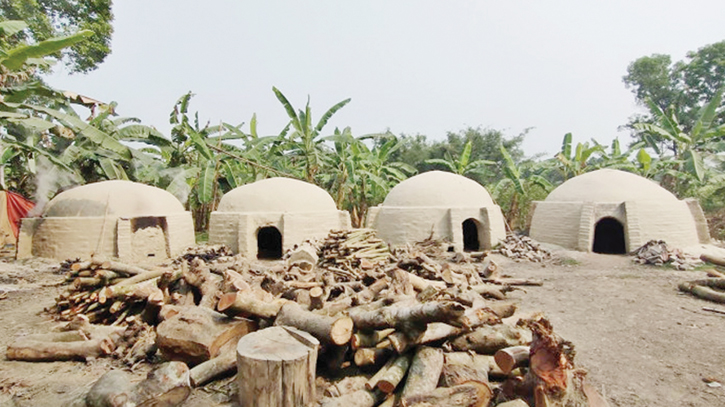
Charcoal factory by the banks of the Dhaleshwari River in Jalsuka village, Manikganj, raises concerns for health and environmental impact. Photo: Messenger
Illegal production of artificial charcoal by burning tree trunks and wood pollutes the surrounding environment and threatens biodiversity.
This operation lacks approval from the Department of Environment. Smoke emitted from the kilns pollutes the air and damages crops. Such activities are observed in Jalsuka village, Dighulia Union, Saturia Upazila, Manikganj.
Local residents are reportedly suffering from respiratory issues and other health problems due to this pollution. In Jalsuka village, an artificial charcoal factory has been established by the banks of the Dhaleshwari River. Surrounded by fields and homes, this factory burns various types of wood, sourced from distant villages, in specially constructed kilns.
These kilns, made with bricks and coated with clay, are loaded with tree trunks and dry wood. When the kilns are fired, thick black smoke engulfs the area. Each kiln consumes 150-200 maunds of wood per batch. Faruk, a worker at the factory, explains that the kilns are built using a special method with bricks. Wood is collected from various villages in Saturia and arranged in the kilns, leaving one opening while sealing others with mud and bricks. It takes 2 to 3 days to set up each kiln, and the wood is burned using various chemicals over 5-7 days, turning it into charcoal. After extinguishing the fire, the charcoal is extracted three days later. Each kiln burns 200-300 maunds of wood per batch. The charcoal is then cooled, cleaned, weighed, and bagged for sale.
This charcoal is bought by various hotel and restaurant owners, who use it for making bread and naan.
Razzak Hossain Raj, President of the Manikganj District Committee of the Green Environment Movement, said that cutting down trees and burning them for fuel is completely prohibited. Moreover, the black smoke harms the environment and crops. This not only destroys forest resources but also causes respiratory diseases among local residents due to the smoke.
Abul Hossain, a resident of Jalsuka village, has set up this illegal charcoal factory. The factory, located by the Dhaleshwari River, uses tree trunks and wood to produce charcoal. Faruk, a worker at the factory, further explains that they buy wood at 160 Taka per maund and sell charcoal at 30-50 Taka per kilogram.
Jewel Rana, a resident of Pulshura village, questions how this factory has been operating for so long, causing environmental damage. The constant emission of black smoke makes the elderly and children cough continuously, and young people are similarly affected. The inadequate height of the kilns leads to crop damage due to the smoke.
Factory owner Abul Hossain admits that they do not have approval from the Department of Environment or local authorities. "We are just doing business to earn a living. We are not harming anyone," he claims.
Md. Shafiul Alam Jewel, Chairman of Dighulia Union Parishad, acknowledges that the kilns disrupt the environmental balance of the area. Hundreds of locals have signed written complaints addressed to him and the Upazila Executive Officer. Despite multiple discussions in the Upazila monthly coordination meetings, the factory remains operational.
Saturia Upazila Executive Officer (UNO) Shanta Rahman has verbally acknowledged the issue of charcoal production in Jalsuka village. She assured that they will investigate the matter and take legal action against these factories soon.
Messenger/Fameema








